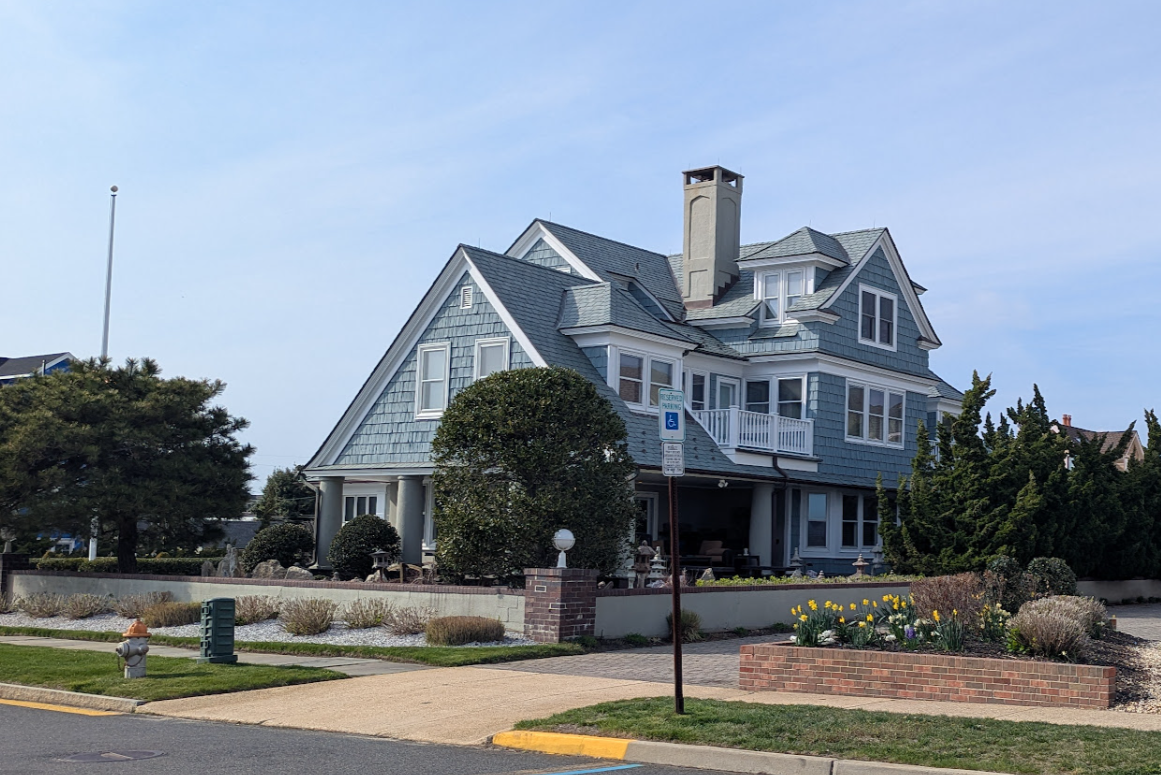A Historic House and a Judge
In 1984, a long-simmering case became the biggest news in the state when Judge Thomas Yaccarino was defending his actions over a house in Sea Girt.
Charles Hinchman's old house, the Dunes, at #1 Philadelphia, had fallen into the hands of a set of companies owned by three Manzo Brothers. The house was constructed around 1904 when Charles took control of the Sea Girt and Spring Lake Land Improvement Company from Henry Yard, who had declared one of the largest personal bankruptcies in NJ history.
From the Sea Girt Land Improvement sales brochure of the early 1900s
Charles, a Main-Line Pa steel and railroad magnate, had been an initial investor in the Sea Girt project in 1875. They left a large lawn between the house and the beach. Charles’ wife, Lydia, a philanthropist, sold the house in 1930 to Mr & Mrs. Harold Reilley, who renovated and updated the house.
By the late 1960s, it was in poor shape. The Reilleys auctioned off the antiques and two lots in front of the house, taking away the direct ocean view. They then put the house up for sale for $85,000 in 1969.
The plumbing and electrical systems needed replacement and significant repairs. It was purchased by the Manzo Brothers. Three brothers owned a large asphalt manufacturing, paving, and construction company, broken up into a number of corporate entities. They owned over 65 individual properties.
They had many municipal projects for roadwork. In the Mid-seventies, one of the entities was accused of overcharging Ocean County towns, systematically shorting weights on road material.
This led other towns in Monmouth and Middlesex to challenge the brother’s company, and they wound up in a feud over lawsuits and their $10+ million in holdings, finger-pointing, and threats.
Superior Court Judge Thomas Yaccarino was asked to preside over the distribution of the web of entities and settlements.
Sometime during this process, Yaccarino looked at #1 Philadelphia as a potential purchase. If business dealings with the subject of one of his court cases weren't an ethical problem, there was a claim that the house was intentionally appraised lower for the judge's benefit. While the Judge wanted to find a quiet town to live in, he never made a bid on the house.
Today, the house is called Sanddollar
Sea Girt and all shore real estate were in a bit of a slump. Interest rates had skyrocketed, and rates for a 30-year fixed-rate mortgage were at 13.88%. There was a reasonable argument that the low appraisal reflected the difficult market.
When audio tapes made by Michael Manzo were released with the Judge discussing the house, Yaccarino claimed that his judgment lapses were due to an auto accident and head injury in 1979. He filed for retirement.
But the Supreme Court removed Yaccarino, a Superior Court Judge, for misconduct in 1985.
There were other accusations. The judge owned and did not disclose his part ownership in the clubs, Montego Bay in Belmar, and the Green Parrott in Neptune. Both eventually lost their liquor licences. He was also accused of favorable treatment of his daughter.
A 2021 review of the case by the Appellate Law blog by Bruce Greenberg squarely blamed the Judge’s actions around the Sea Girt house as the cause for removal.
“Finally, and most importantly to the Court, Yaccarino had attempted to acquire a piece of property that was going to be sold in connection with a corporate dissolution case over which Yaccarino was presiding. There were tape recordings of Yaccarino engaging in conversations about that property that were damning to him. When Yaccarino learned of the tapes, he advocated that they be destroyed and that a witness falsely testify “that the tapes never existed.” As the Supreme Court concluded, “[r]espondent attempted to conceal his wrongdoing by a pattern of conduct that at the very least could lead a knowledgeable observer to believe that there was an attempt to have persons suborn perjury and to have evidence of wrongdoing destroyed.” -https://www.appellatelaw-nj.com/removal-of-judges-for-misconduct
In 1986, Real Estate executive William Sitar of Boston Blvd. purchased The Dunes and renovated it to its former glory for his personal use.


